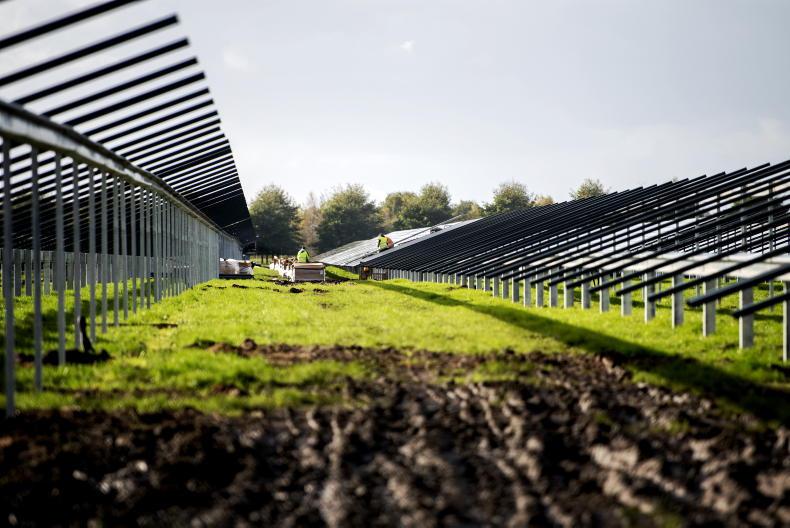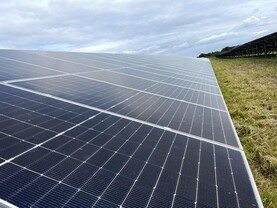As solar farm construction ramps up and the pipeline of projects increase, many farmers are now entering their first direct payment cycle with panels on the ground.
Over the past number of weeks, the Irish Farmers Journal has received a number of questions regarding how solar farms impact farmers’ direct payments and nitrates.
According to the Department of Agriculture, in general, solar panels are considered ineligible features under the Basic Income Support for Sustainability Scheme (BISS) and other area-based schemes. Deductions must be made to the claimed area of a parcel to take account of areas not available for agricultural activity, such as the areas under panel supports, roads, buildings and other structures.
However, the Department states that the extent of the deduction will depend on the availability of the area around and under the solar panels, ie whether it is possible to graze both around and under the solar panels.
Parcels will be examined on an individual basis, as eligibility depends on the area of a parcel taken up with solar panels and associated structures, and the agricultural activity taking place on the parcel.
For nitrates, the reference area is used to calculate the available nutrient area of a parcel. It is the total area of the parcel minus any non-productive areas (eg scrub, rock, buildings, roadways, permanent fence, etc).
Scenarios
The following scenarios outline the different levels of access an applicant might have to the solar panel areas and what reductions should apply.
No access/no agricultural activity: The applicant is denied access to the area around the solar panels, or no agricultural activity is taking place. A boundary fence may or may not be present. All the area around the solar panels and supporting structures is ineligible. The area is not eligible for inclusion in the reference area for nitrates calculations. Limited access: The applicant has access to the green areas between rows of panels and the surrounding area not containing the panels or supporting structures. These green areas are eligible once an agricultural activity is taking place, ie topping, grazing, etc. The area under the panels, supporting structures or inaccessible areas are not eligible and must be excluded. If a boundary fence is present around the site, the applicant must have access to the site. Only the area available for grazing or cutting is eligible for inclusion in the reference area for nitrates calculations.Unlimited access: The solar panels are erected in a manner that allows for unrestricted access to grazing animals, like sheep. The area around and under the panels is eligible, once there is an agricultural activity, ie sheep grazing, but deductions must be made for the area under supporting structures and the area lost to the panel supports/pylons. If a boundary fence is present around the site, the applicant must have access to the site. The area is eligible for inclusion in the reference area for nitrates calculations. In all three scenarios above, if the area in a parcel is reduced by greater than 70%, or if there is no agricultural activity in the parcel, or if the applicant does not own, lease or rent the land, then the parcel will be considered ineligible. If the lands are leased/rented out to a third party, the applicant must have written agreement to access the area throughout the calendar year.
LPIS land parcels can contain a single field, part of a field or multiple fields, and where necessary for scheme purposes, individual parcels may be created to identify lands that are part of a specific scheme measure, for example ACRES actions.
The Department reiterated that imagery and software it uses can accurately measure and calculate the area of features in a parcel, like buildings, roadways and solar panel arrays. Aerial imagery is used, with a resolution of up to 25cm.
Any queries can be directed to the Direct Payments Helpdesk on 057-8674422 or DirectPaymentsCorrespondence@agriculture.gov.ie.
As solar farm construction ramps up and the pipeline of projects increase, many farmers are now entering their first direct payment cycle with panels on the ground.
Over the past number of weeks, the Irish Farmers Journal has received a number of questions regarding how solar farms impact farmers’ direct payments and nitrates.
According to the Department of Agriculture, in general, solar panels are considered ineligible features under the Basic Income Support for Sustainability Scheme (BISS) and other area-based schemes. Deductions must be made to the claimed area of a parcel to take account of areas not available for agricultural activity, such as the areas under panel supports, roads, buildings and other structures.
However, the Department states that the extent of the deduction will depend on the availability of the area around and under the solar panels, ie whether it is possible to graze both around and under the solar panels.
Parcels will be examined on an individual basis, as eligibility depends on the area of a parcel taken up with solar panels and associated structures, and the agricultural activity taking place on the parcel.
For nitrates, the reference area is used to calculate the available nutrient area of a parcel. It is the total area of the parcel minus any non-productive areas (eg scrub, rock, buildings, roadways, permanent fence, etc).
Scenarios
The following scenarios outline the different levels of access an applicant might have to the solar panel areas and what reductions should apply.
No access/no agricultural activity: The applicant is denied access to the area around the solar panels, or no agricultural activity is taking place. A boundary fence may or may not be present. All the area around the solar panels and supporting structures is ineligible. The area is not eligible for inclusion in the reference area for nitrates calculations. Limited access: The applicant has access to the green areas between rows of panels and the surrounding area not containing the panels or supporting structures. These green areas are eligible once an agricultural activity is taking place, ie topping, grazing, etc. The area under the panels, supporting structures or inaccessible areas are not eligible and must be excluded. If a boundary fence is present around the site, the applicant must have access to the site. Only the area available for grazing or cutting is eligible for inclusion in the reference area for nitrates calculations.Unlimited access: The solar panels are erected in a manner that allows for unrestricted access to grazing animals, like sheep. The area around and under the panels is eligible, once there is an agricultural activity, ie sheep grazing, but deductions must be made for the area under supporting structures and the area lost to the panel supports/pylons. If a boundary fence is present around the site, the applicant must have access to the site. The area is eligible for inclusion in the reference area for nitrates calculations. In all three scenarios above, if the area in a parcel is reduced by greater than 70%, or if there is no agricultural activity in the parcel, or if the applicant does not own, lease or rent the land, then the parcel will be considered ineligible. If the lands are leased/rented out to a third party, the applicant must have written agreement to access the area throughout the calendar year.
LPIS land parcels can contain a single field, part of a field or multiple fields, and where necessary for scheme purposes, individual parcels may be created to identify lands that are part of a specific scheme measure, for example ACRES actions.
The Department reiterated that imagery and software it uses can accurately measure and calculate the area of features in a parcel, like buildings, roadways and solar panel arrays. Aerial imagery is used, with a resolution of up to 25cm.
Any queries can be directed to the Direct Payments Helpdesk on 057-8674422 or DirectPaymentsCorrespondence@agriculture.gov.ie.






 This is a subscriber-only article
This is a subscriber-only article










SHARING OPTIONS: